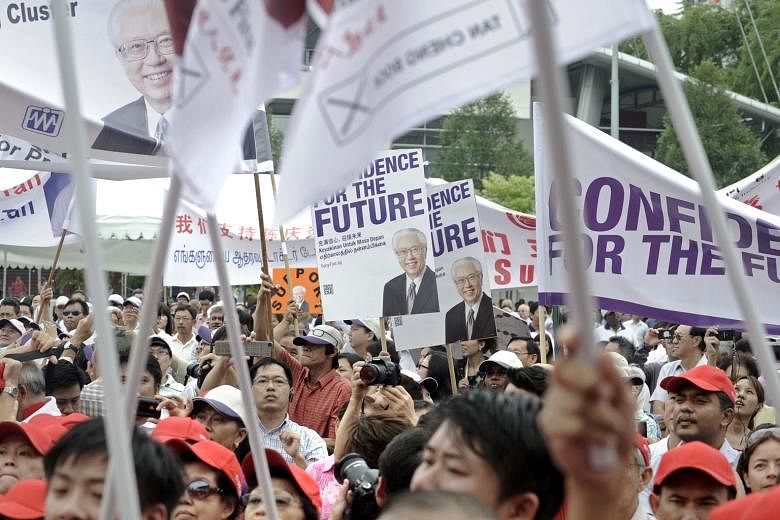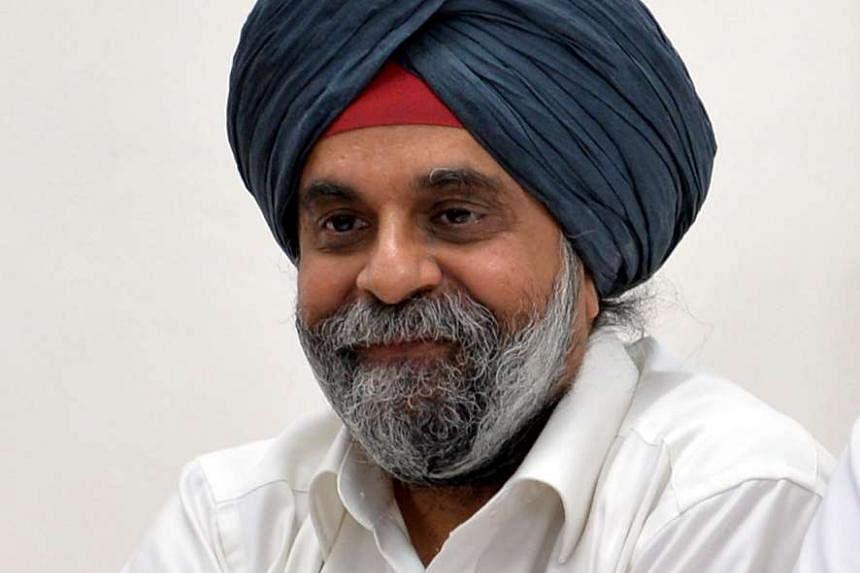To do a U-turn or not to do a U-turn on the elected presidency?
This question was posed by public intellectual and dean of the Lee Kuan Yew School of Public Policy Kishore Mahbubani in a column in The Straits Times last week.
With the next presidential election due by August next year, this debate, first raised in the aftermath of the 2011 Presidential Election, has become timely again.
At its crux: What to do about the disconnect between the purpose of the elected president and the process of electing the president.
The office of the president is a force for stability in the political system, said President Tony Tan Keng Yam a week ago.
Singapore's leaders in the late 1980s thought so too, when mooting the constitutional amendment to establish an elected president. At that time, Parliament appointed the president.
In two White Papers and debates in the House and on television, the Government set out its case for the elected president: He was needed as a custodian and checking mechanism to protect Singapore's national reserves and the integrity of its public services.
This would help deliver stability and progress for Singapore, which would be in its long-term interest.
To act as such a stabiliser, the president had to be above party politics and play a unifying role.
Fast forward to the 2011 Presidential Election.
Four men threw a hat into the ring. The winner, Dr Tony Tan Keng Yam, beat the runner-up, Dr Tan Cheng Bock, by 7,382 votes - a difference of less than 2 per cent.
The election was widely seen as divisive - a far cry from the unity and stability the elected presidency was created to bring about.
Why?
Chiefly because many among voters did not understand the rationale for an elected president, or the constitutional limits on him - or perhaps did not agree.
An Institute of Policy Studies (IPS) poll of more than 2,000 Singaporeans after the 2011 election found that four out of five wrongly thought the president ensures that the Government manages the economy wisely.
Three in four thought wrongly that he was free to speak publicly on national issues he deemed important.
"Voters thought the elected presidency was a separate locus of power whose constitutional role was to be a countervailing force to the elected parliamentary system of government," says Singapore Management University law don and political watcher Eugene Tan.
This despite former senior minister S. Jayakumar - who was involved in drafting the constitutional amendment - stating unequivocally during the 2011 hustings that the president was not "a centre of power unto himself".
Instead, the president was bound by the Constitution, which gave him only "discretionary, custodial power" in protecting the reserves, key public-sector appointments, Internal Security Act detentions, investigations by the Corrupt Practices Investigation Bureau and restraining orders under the Maintenance of Religious Harmony Act.
Even in these five areas, the president had only blocking powers and was not allowed to initiate decisions or policies, he said.
WHY THE CONFUSION?
Some of the confusion may have stemmed from voters' unfamiliarity with the office.
Associate Professor Tan points to the changes in Singapore's demographics since the 1980s - the voters born after Singapore became independent outnumber those born before. A first-time voter aged 21 in 2011 would have been a year old during the 1991 debates on the elected presidency.
Another explanation: Some voters deliberately wanted a more activist president rather than a unifier.
"A younger generation of voters is not too enamoured with a one-party dominant system. Voters regard such an extended period of political dominance as not just an aberration, but an un-level playing field," says Assoc Prof Tan.
Still, such views about younger voters do not gel with developments seen in the 2015 General Election, where the ruling party's vote share rose to 69.9 per cent - suggesting that voters were not uncomfortable with the People's Action Party (PAP) continuing to be dominant in Parliament. And as an IPS survey of 2,015 voters found afterwards, the biggest shift towards the PAP came from those aged 21 to 29, as well as from those aged 65 and older.
Commentators nevertheless maintain that a correlation exists between the Government's policies and actions and how voters react. And indeed, in 2011, the politics of the general election - held just three months before the presidential election that year - appeared to influence the latter.
"In 2011, anti-PAP sentiments played out during the PE (presidential election). This was not expected of a PE," says retired PAP MP Inderjit Singh.
Some presidential hopefuls then found it useful to "over promise" in their campaigns as a way to win votes.
"The process of electing a non-partisan and apolitical president through competitive means is likely, at one extreme, to lead aspirants to consider popular, if not populist, means to win votes," says Assoc Prof Tan.
In the wake of the 2011 Presidential Election, commentators questioned the process of the national electorate directly electing the president, no doubt mindful that the close winning margin that year could also be seen as a reflection of how divisions in politics can impact outcomes.
A week after the election, prominent businessman Ho Kwon Ping, who is Banyan Tree Holdings' executive chairman, and IPS director and then ST associate editor Janadas Devan wrote: "You cannot hold an election for an apolitical office and not expect politics to intrude."
Mr Singh tells The Sunday Times: "If we start seeing the same issues at a parliamentary election influencing the presidential election, then we need to look at what the real objective of an elected president is and see if we can achieve the same objective through other means."
Other possible trends also point to the elected presidency being due for a review, say observers.
For instance, candidates of the right stature may be more reluctant to run for the office, given the politically charged nature of the contest. Furthermore, minority representation is not assured.
Some have voiced the worry that the electorate will vote based on race, making it harder for minority-race candidates to be elected on their own merit.
Says IPS senior research fellow Gillian Koh: "There is a desire to see minority representation in the symbolic and ceremonial parts of that role.
"But some have no confidence that a minority candidate can ever be voted into office."
What sort of changes could address these concerns?
POSSIBLE LEVERS
One idea is to shrink the pool of eligible presidential candidates.
With fewer candidates, the argument goes, chances are that the mandate the winner eventually receives will be more decisive.
This can be done by tightening the eligibility criteria for presidential hopefuls, which have been unchanged for the last 25 years.
The field of eligible Singaporeans is much larger now since the qualification requirements were drawn up in 1991, says Assoc Prof Tan.
For example, a presidential candidate must have served for no less than three years as chairman or chief executive of a company with a paid-up capital of at least $100 million, or in any other comparable position of seniority.
But with many more companies now with $100 million paid-up capital than there were in 1991, it is worth looking at whether this bar should be raised, he says.
"This will reduce the size of eligible persons, but it is a worthwhile trade-off," he says.
"By raising the bar, we can help to ensure that those eligible are up to the task, given the larger and more demanding scope of the elected president's custodial role."
Another more controversial idea is to change who elects the president. Mr Kishore, for instance, suggests returning to Parliament the power to appoint the president.
This would ensure that the president can be rotated among minority groups and be chosen on the basis of merit, not popularity.
Another variant of this suggestion is letting an electoral college nominate the presidential candidates and elect one of these.
This was the idea mooted by Mr Ho and Mr Janadas in their column in 2011. As they explained: "If our aim is an apolitical and impartial president, our means for choosing one should be commensurate with that aim."
As for Mr Singh, he has suggested Upper and Lower Houses of Parliament, instead of the current single legislative chamber. He adds that the Upper House of elected and appointed members can choose a president from among themselves.
However, observers say that returning this power to Parliament as it is would weaken Singapore's political system by removing an important layer of checks and balances.
This is especially so if the president retains his powers of safeguarding the reserves.
Some of these ideas have been criticised as being elitist.
Having an electoral college appoint the president, for instance, shows a lack of trust by the elite in the electorate, said retired top civil servant Ngiam Tong Dow in 2011.
"If you try to change the rules when it's not going your way, I think the electorate will not respect you for it," he said.
It would also not be wise to ignore voter sentiment. And while presidential candidates in the United States, for instance, are pre-selected by party caucuses, it is the voters at large who have the final say.
According to the IPS survey, 91 per cent of respondents said the elected president must be chosen through an election.
Of the elected president's powers to approve spending of the reserves and key civil service appointments, some argue that he should also have the political mandate to wield them.
Dr Koh, arguing why the president must receive the popular mandate, says: "It is critical that he or she has the political mandate to counter the popularly elected frontbench."
The timing of such a move is also up for debate - whether changes should be made now, before the 2017 presidential election, or after.
Mr Singh argues that any changes to the presidency should come after the next presidential election "so that Singaporeans see the objectivity of the changes proposed, which is for the good of the longer-term politics of Singapore".
Whichever the case, more clarity - via public education, perhaps - is needed on the role of the president, and the government, just as it did when the idea of an elected president was first mooted, will have to make its case and win over the public for any proposed changes it has in mind.
Charissa Yong




